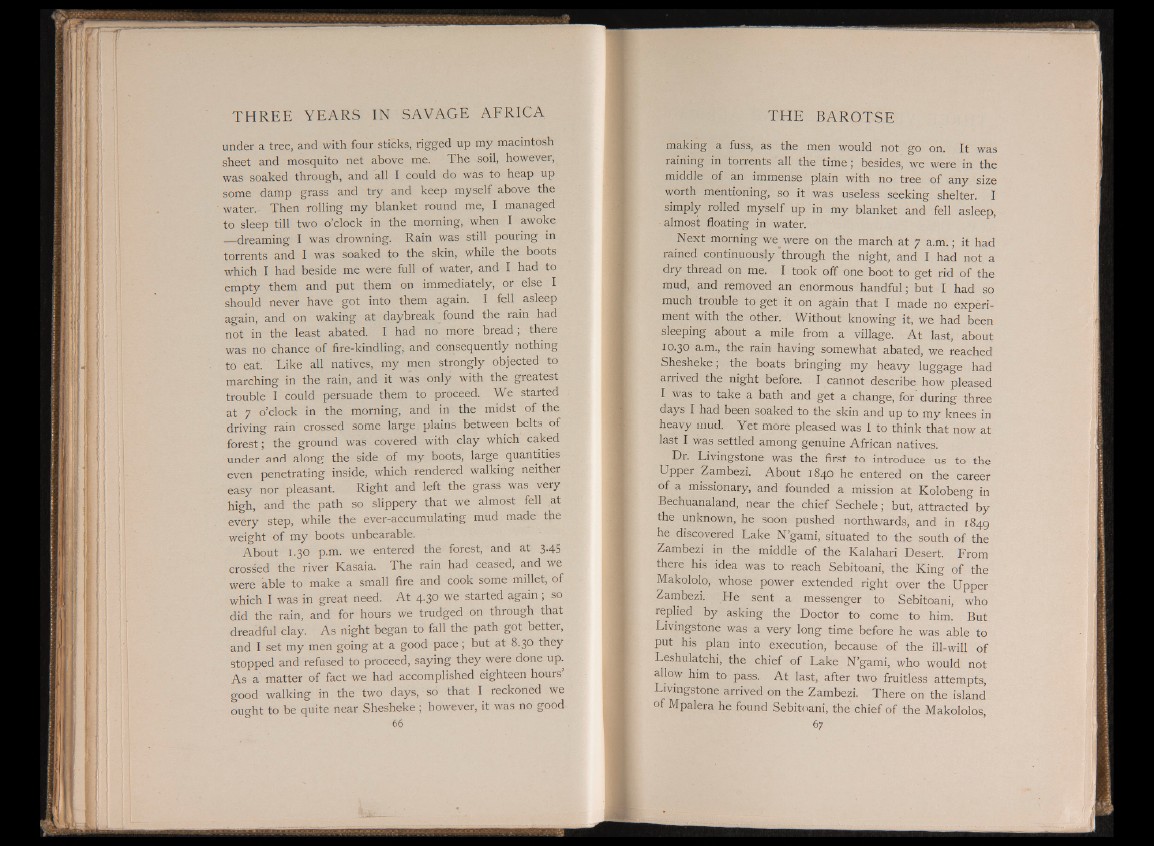
under a tree, and with four sticks, rigged up my macintosh
sheet and mosquito net above me. The soil, however,
was soaked through, and all I could do was to heap up
some damp grass and try and keep myself above the
water. Then rolling my blanket round me, I managed
to sleep till two o’clock in the morning, when I awoke
dreaming I was drowning. Rain was still pouring in
torrents and I was soaked to the skin, while the boots
which I had beside me were full of water, and I had to
empty them and put them on immediately, or else I
should never have got into them again. I fell asleep
again, and on waking at daybreak found the rain had
not in the least abated. I had no more. bread; there
was no chance of fire-kindling; and consequently nothing
to eat. Like all natives, my men strongly objected to
marching in the rain, and it was only with the greatest
trouble I could persuade them to proceed. We started
at 7 o’clock in the morning, and in the midst of the
driving rain crossed some large, plains between belts of
forest; the ground was covered with clay which caked
under and along the side of my boots, large quantities
even penetrating inside, which rendered walking neither
easy nor pleasant. Right and left the grass was very
high, and the path so slippery that we almost fell at
every step, while the ever-accumulating mud made the
weight of my boots unbearable.
About 1.30 p.m. we entered the forest, and at 3.45
crossed the river Kasaia. The rain had ceased, and we
were able to make a small fire and cook some millet, of
which I was in great need. At 4.30 we started again ; so
did the rain, and for hours we trudged on through that
dreadful clay. As night began to fall the path got better,
and I set my men going at a good pace; but at 8.30 they
stopped and refused to proceed, saying they were done up.
As a matter of fact we had accomplished eighteen hours’
good walking in the two days, so that I reckoned we
ought to be quite near Shesheke; however, it was no good
66
making a fuss, as the men would not go on. It was
raining in torrents all the time; besides, we were in the
middle of an immense plain with no tree of any size
worth mentioning, so it was useless seeking shelter. I
simply rolled myself up in my blanket and fell asleep,
almost floating in water.
Next morning we^were on the march at 7 a.m.; it had
rained continuously "through the night, and I had not a
dry thread on me. I took off one boot to get rid of the
mud,, and removed an enormous handful; but I had so
much trouble to get it on again that I made no experiment
with the other. Without knowing it, we had been
sleeping about a mile from a village. At last, about
10.30 a.m., the rain having somewhat abated, we reached
Shesheke; the boats bringing my heavy luggage had
arrived the night before. I cannot describe how pleased
I was to take a bath and get a change, for during three
days I had been soaked to the skin and up to my knees in
heavy mud. Yet more pleased was I to think that now at
last I was settled among genuine African natives.
Dr. Livingstone was the first to introduce us to the
Upper Zambezi. About 1840 he entered on the career
of a missionary, and founded a mission at Kolobeng in
Bechuanaland, near the chief Sechele; but, attracted by
the unknown, he soon pushed northwards, and in 1849
he discovered Lake N’gami, situated to the south of the
Zambezi in the middle of the Kalahari Desert. From
there his idea was to reach Sebitoani, the King of the
Makololo, whose power extended right over the Upper
Zambezi. He sent a messenger to Sebitoani, who
replied by asking the Doctor to come to him. But
Livingstone was a very long time before he was able to
put his plan into execution, because of the ill-will of
Leshulatchi, the chief of Lake N’gami, who would not
allow him to pass. At last, after two fruitless attempts,
Livingstone arrived on the Zambezi. There on the island
of Mpalera he found Sebitoani, the chief of the Makololos,
67